#Educational Loan
Explore tagged Tumblr posts
Text
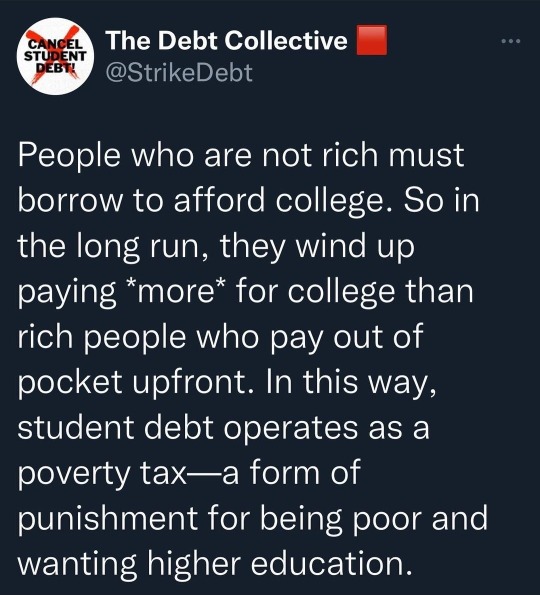
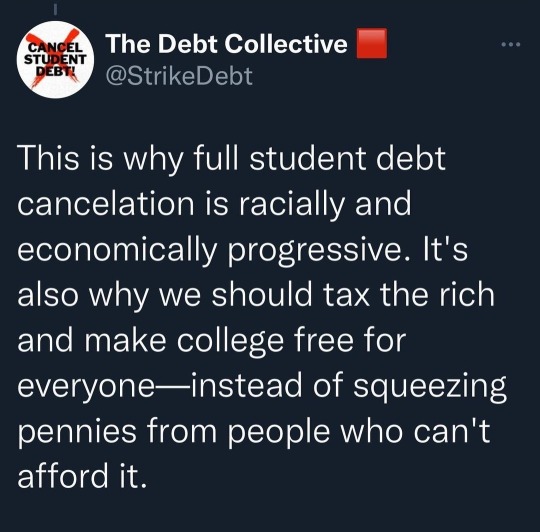
34K notes
·
View notes
Text
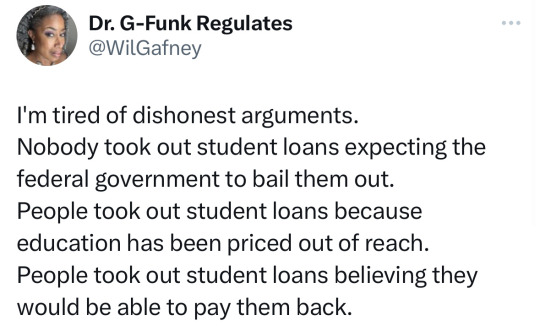
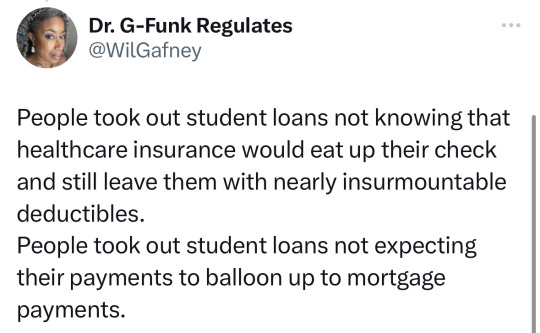
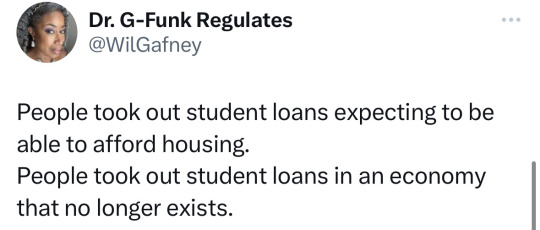
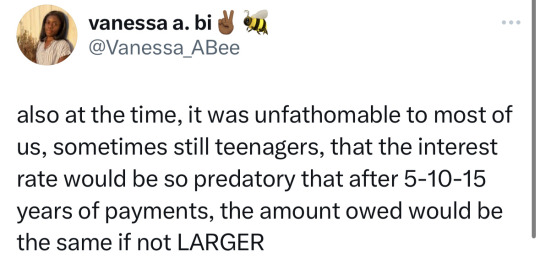
#cancel student debt#student loans#current events#government#education#college#capitalism#eat the rich
33K notes
·
View notes
Text

Educational Loan
Education loans are a very useful tool with which you can shape your dreams of higher education.
0 notes
Text

#us politics#politics#student loans#department of education#twitter#tweets#tweet#meme#memes#funny#lol#humor
846 notes
·
View notes
Photo

Educational Loan :- Education loans are a very useful tool with which you can shape your dreams of higher education.
0 notes
Text
MIT libraries are thriving without Elsevier

I'm coming to BURNING MAN! On TUESDAY (Aug 27) at 1PM, I'm giving a talk called "DISENSHITTIFY OR DIE!" at PALENQUE NORTE (7&E). On WEDNESDAY (Aug 28) at NOON, I'm doing a "Talking Caterpillar" Q&A at LIMINAL LABS (830&C).

Once you learn about the "collective action problem," you start seeing it everywhere. Democrats – including elected officials – all wanted Biden to step down, but none of them wanted to be the first one to take a firm stand, so for months, his campaign limped on: a collective action problem.
Patent trolls use bullshit patents to shake down small businesses, demanding "license fees" that are high, but much lower than the cost of challenging the patent and getting it revoked. Collectively, it would be much cheaper for all the victims to band together and hire a fancy law firm to invalidate the patent, but individually, it makes sense for them all to pay. A collective action problem:
https://locusmag.com/2013/11/cory-doctorow-collective-action/
Musicians get royally screwed by Spotify. Collectively, it would make sense for all of them to boycott the platform, which would bring it to its knees and either make it pay more or put it out of business. Individually, any musician who pulls out of Spotify disappears from the horizon of most music fans, so they all hang in – a collective action problem:
https://pluralistic.net/2024/06/21/off-the-menu/#universally-loathed
Same goes for the businesses that get fucked out of 30% of their app revenues by Apple and Google's mobile business. Without all those apps, Apple and Google wouldn't have a business, but any single app that pulls out commits commercial suicide, so they all hang in there, paying a 30% vig:
https://pluralistic.net/2024/08/15/private-law/#thirty-percent-vig
That's also the case with Amazon sellers, who get rooked for 45-51 cents out of every dollar in platform junk fees, and whose prize for succeeding despite this is to have their product cloned by Amazon, which underprices them because it doesn't have to pay a 51% rake on every sale. Without third-party sellers there'd be no Amazon, but it's impossible to get millions of sellers to all pull out at once, so the Bezos crime family scoops up half of the ecommerce economy in bullshit fees:
https://pluralistic.net/2023/11/06/attention-rents/#consumer-welfare-queens
This is why one definition of "corruption" is a system with "concentrated gains and diffuse losses." The company that dumps toxic waste in your water supply reaps all the profits of externalizing its waste disposal costs. The people it poisons each bear a fraction of the cost of being poisoned. The environmental criminal has a fat warchest of ill-gotten gains to use to bribe officials and pay fancy lawyers to defend it in court. Its victims are each struggling with the health effects of the crimes, and even without that, they can't possibly match the polluter's resources. Eventually, the polluter spends enough money to convince the Supreme Court to overturn "Chevron deference" and makes it effectively impossible to win the right to clean water and air (or a planet that's not on fire):
https://www.cfr.org/expert-brief/us-supreme-courts-chevron-deference-ruling-will-disrupt-climate-policy
Any time you encounter a shitty, outrageous racket that's stable over long timescales, chances are you're looking at a collective action problem. Certainly, that's the underlying pathology that preserves the scholarly publishing scam, which is one of the most grotesque, wasteful, disgusting frauds in our modern world (and that's saying something, because the field is crowded with many contenders).
Here's how the scholarly publishing scam works: academics do original scholarly research, funded by a mix of private grants, public funding, funding from their universities and other institutions, and private funds. These academics write up their funding and send it to a scholarly journal, usually one that's owned by a small number of firms that formed a scholarly publishing cartel by buying all the smaller publishers in a string of anticompetitive acquisitions. Then, other scholars review the submission, for free. More unpaid scholars do the work of editing the paper. The paper's author is sent a non-negotiable contract that requires them to permanently assign their copyright to the journal, again, for free. Finally, the paper is published, and the institution that paid the researcher to do the original research has to pay again – sometimes tens of thousands of dollars per year! – for the journal in which it appears.
The academic publishing cartel insists that the millions it extracts from academic institutions and the billions it reaps in profit are all in service to serving as neutral, rigorous gatekeepers who ensure that only the best scholarship makes it into print. This is flatly untrue. The "editorial process" the academic publishers take credit for is virtually nonexistent: almost everything they publish is virtually unchanged from the final submission format. They're not even typesetting the paper:
https://link.springer.com/article/10.1007/s00799-018-0234-1
The vetting process for peer-review is a joke. Literally: an Australian academic managed to get his dog appointed to the editorial boards of seven journals:
https://www.atlasobscura.com/articles/olivia-doll-predatory-journals
Far from guarding scientific publishing from scams and nonsense, the major journal publishers have stood up entire divisions devoted to pay-to-publish junk science. Elsevier – the largest scholarly publisher – operated a business unit that offered to publish fake journals full of unreveiwed "advertorial" papers written by pharma companies, packaged to look like a real journal:
https://web.archive.org/web/20090504075453/http://blog.bioethics.net/2009/05/merck-makes-phony-peerreview-journal/
Naturally, academics and their institutions hate this system. Not only is it purely parasitic on their labor, it also serves as a massive brake on scholarly progress, by excluding independent researchers, academics at small institutions, and scholars living in the global south from accessing the work of their peers. The publishers enforce this exclusion without mercy or proportion. Take Diego Gomez, a Colombian Masters candidate who faced eight years in prison for accessing a single paywalled academic paper:
https://www.eff.org/deeplinks/2014/07/colombian-student-faces-prison-charges-sharing-academic-article-online
And of course, there's Aaron Swartz, the young activist and Harvard-affiliated computer scientist who was hounded to death after he accessed – but did not publish – papers from MIT's JSTOR library. Aaron had permission to access these papers, but JSTOR, MIT, and the prosecutors Stephen Heymann and Carmen Ortiz argued that because he used a small computer program to access the papers (rather than clicking on each link by hand) he had committed 13 felonies. They threatened him with more than 30 years in prison, and drew out the proceedings until Aaron was out of funds. Aaron hanged himself in 2013:
https://en.wikipedia.org/wiki/Aaron_Swartz
Academics know all this terrible stuff is going on, but they are trapped in a collective action problem. For an academic to advance in their field, they have to publish, and they have to get their work cited. Academics all try to publish in the big prestige journals – which also come with the highest price-tag for their institutions – because those are the journals other academics read, which means that getting published is top journal increases the likelihood that another academic will find and cite your work.
If academics could all agree to prioritize other journals for reading, then they could also prioritize other journals for submissions. If they could all prioritize other journals for submissions, they could all prioritize other journals for reading. Instead, they all hold one another hostage, through a wicked collective action problem that holds back science, starves their institutions of funding, and puts their colleagues at risk of imprisonment.
Despite this structural barrier, academics have fought tirelessly to escape the event horizon of scholarly publishing's monopoly black hole. They avidly supported "open access" publishers (most notably PLoS), and while these publishers carved out pockets for free-to-access, high quality work, the scholarly publishing cartel struck back with package deals that bundled their predatory "open access" journals in with their traditional journals. Academics had to pay twice for these journals: first, their institutions paid for the package that included them, then the scholars had to pay open access submission fees meant to cover the costs of editing, formatting, etc – all that stuff that basically doesn't exist.
Academics started putting "preprints" of their work on the web, and for a while, it looked like the big preprint archive sites could mount a credible challenge to the scholarly publishing cartel. So the cartel members bought the preprint sites, as when Elsevier bought out SSRN:
https://www.techdirt.com/2016/05/17/disappointing-elsevier-buys-open-access-academic-pre-publisher-ssrn/
Academics were elated in 2011, when Alexandra Elbakyan founded Sci-Hub, a shadow library that aims to make the entire corpus of scholarly work available without barrier, fear or favor:
https://sci-hub.ru/alexandra
Sci-Hub neutralized much of the collective action trap: once an article was available on Sci-Hub, it became much easier for other scholars to locate and cite, which reduced the case for paying for, or publishing in, the cartel's journals:
https://arxiv.org/pdf/2006.14979
The scholarly publishing cartel fought back viciously, suing Elbakyan and Sci-Hub for tens of millions of dollars. Elsevier targeted prepress sites like academia.edu with copyright threats, ordering them to remove scholarly papers that linked to Sci-Hub:
https://svpow.com/2013/12/06/elsevier-is-taking-down-papers-from-academia-edu/
This was extremely (if darkly) funny, because Elsevier's own publications are full of citations to Sci-Hub:
https://eve.gd/2019/08/03/elsevier-threatens-others-for-linking-to-sci-hub-but-does-it-itself/
Meanwhile, scholars kept the pressure up. Tens of thousands of scholars pledged to stop submitting their work to Elsevier:
http://thecostofknowledge.com/
Academics at the very tops of their fields publicly resigned from the editorial board of leading Elsevier journals, and published editorials calling the Elsevier model unethical:
https://www.theguardian.com/science/blog/2012/may/16/system-profit-access-research
And the New Scientist called the racket "indefensible," decrying the it as an industry that made restricting access to knowledge "more profitable than oil":
https://www.newscientist.com/article/mg24032052-900-time-to-break-academic-publishings-stranglehold-on-research/
But the real progress came when academics convinced their institutions, rather than one another, to do something about these predator publishers. First came funders, private and public, who announced that they would only fund open access work:
https://www.nature.com/articles/d41586-018-06178-7
Winning over major funders cleared the way for open access advocates worked both the supply-side and the buy-side. In 2019, the entire University of California system announced it would be cutting all of its Elsevier subscriptions:
https://www.science.org/content/article/university-california-boycotts-publishing-giant-elsevier-over-journal-costs-and-open
Emboldened by the UC system's principled action, MIT followed suit in 2020, announcing that it would no longer send $2m every year to Elsevier:
https://pluralistic.net/2020/06/12/digital-feudalism/#nerdfight
It's been four years since MIT's decision to boycott Elsevier, and things are going great. The open access consortium SPARC just published a stocktaking of MIT libraries without Elsevier:
https://sparcopen.org/our-work/big-deal-knowledge-base/unbundling-profiles/mit-libraries/
How are MIT's academics getting by without Elsevier in the stacks? Just fine. If someone at MIT needs access to an Elsevier paper, they can usually access it by asking the researchers to email it to them, or by downloading it from the researcher's site or a prepress archive. When that fails, there's interlibrary loan, whereby other libraries will send articles to MIT's libraries within a day or two. For more pressing needs, the library buys access to individual papers through an on-demand service.
This is how things were predicted to go. The libraries used their own circulation data and the webservice Unsub to figure out what they were likely to lose by dropping Elsevier – it wasn't much!
https://unsub.org/
The MIT story shows how to break a collective action problem – through collective action! Individual scholarly boycotts did little to hurt Elsevier. Large-scale organized boycotts raised awareness, but Elsevier trundled on. Sci-Hub scared the shit out of Elsevier and raised awareness even further, but Elsevier had untold millions to spend on a campaign of legal terror against Sci-Hub and Elbakyan. But all of that, combined with high-profile defections, made it impossible for the big institutions to ignore the issue, and the funders joined the fight. Once the funders were on-side, the academic institutions could be dragged into the fight, too.
Now, Elsevier – and the cartel – is in serious danger. Automated tools – like the Authors Alliance termination of transfer tool – lets academics get the copyright to their papers back from the big journals so they can make them open access:
https://pluralistic.net/2021/09/26/take-it-back/
Unimaginably vast indices of all scholarly publishing serve as important adjuncts to direct access shadow libraries like Sci-Hub:
https://pluralistic.net/2021/10/28/clintons-ghost/#cornucopia-concordance
Collective action problems are never easy to solve, but they're impossible to address through atomized, individual action. It's only when we act as a collective that we can defeat the corruption – the concentrated gains and diffuse losses – that allow greedy, unscrupulous corporations to steal from us, wreck our lives and even imprison us.

Community voting for SXSW is live! If you wanna hear RIDA QADRI and me talk about how GIG WORKERS can DISENSHITTIFY their jobs with INTEROPERABILITY, VOTE FOR THIS ONE!

If you'd like an essay-formatted version of this post to read or share, here's a link to it on pluralistic.net, my surveillance-free, ad-free, tracker-free blog:
https://pluralistic.net/2024/08/16/the-public-sphere/#not-the-elsevier
#pluralistic#libraries#glam#elsevier#monopolies#antitrust#scams#open access#scholarship#education#lis#oa#publishing#scholarly publishing#sci-hub#preprints#interlibrary loan#aaron swartz#aaronsw#collective action problems
626 notes
·
View notes
Text
Just found out that women have to borrow more to pay for college, and then take longer to pay back their loans. Parents save more money for their sons, because of the breadwinner gender role. Colleges avoid taking too many girls into their classes and give boys' applications a second look. Once in college, girls are more likely to send money back to their parents to help support them (the same parents who saved less for their college education, because sons are the breadwinners...). Lots of female dominated professions like nursing require degrees, but any field with 'too many women' pays less. Once they're in the field, even if it is male-dominated, women are again paid less than their male counterparts (women are more likely to be penalized for asking for raises etc, and more likely to be overlooked for promotions). If they become mothers, that sets them back even further.
But men still complain that there are special scholarships for women. Lol.
Sources:
Colleges avoid taking too many women:
https://www.nytimes.com/2023/09/08/magazine/men-college-enrollment.html
All other statistics:
https://www.stlouisfed.org/-/media/project/frbstl/stlouisfed/files/pdfs/iee/eei/wocstl-stlfed-03-nov-2022.pdf?sc_lang=en&hash=67A421B90B88E88EA3DF5FCBBFDCD4AE
#politics#feminism#student loans#interesting#education#college#university#liberal feminism#radical feminism#democrats#us politics
1K notes
·
View notes
Photo
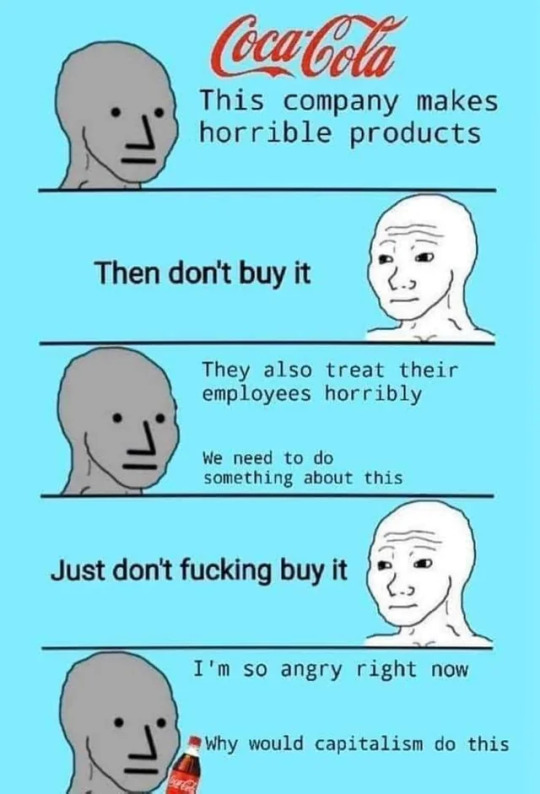
*You should recognize bad practices AND not voluntarily support companies through conducting business (i.e. purchasing luxury products).
#Capitalism#Socialism#Politics#Anticapitalism#Antisocialism#Wage#Wage Gap#Eat the Rich#Minimum Wage#Living Wage#Affordable Education#Affordable Healthcare#Free Education#Free Healthcare#Student Loans
2K notes
·
View notes
Text
#us politics#news#biden administration#president joe biden#student debt#student debt forgiveness#department of education#2024#student loans
108 notes
·
View notes
Text

126 notes
·
View notes
Text
actually i think jiang cheng would be one of those people who doesn't care about the whole student loan problem at all....because jin ling is rich enough to pay his own way through college and jiang cheng dgaf about anyone else lmao
#mdzs#mo dao zu shi#jiang cheng#yanyan speaks#jc is rich enough to pay for jl + every one of his own people's educations. everyone else can get fucked#meanwhile lwj doesn't even know that student loans are a thing#wwx philanthropically supports the educations of a specific handful of first-gen students. but he doesn't/cannot do more#the only character trying to address the problem at a structural level is jin guangyao lmao
66 notes
·
View notes
Text
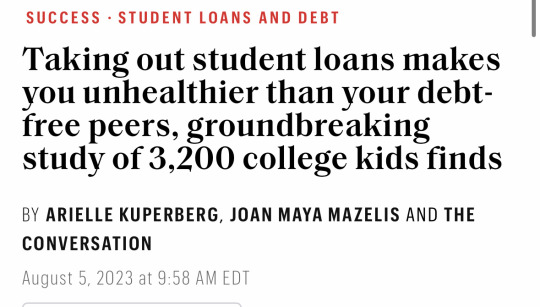
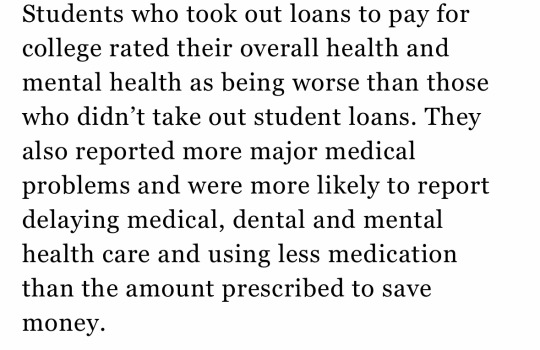
Source
Sad but completely unsurprising…
Cancel all student debt.
#education#public health#health#students#current events#news#government#the left#progressive#cancel student loans#cancel student debt
2K notes
·
View notes
Text

Saying the quiet part out loud
#college#university#school#education#student loans#education should be free#greedisthecreed#class war#classwar#capitalism#utas#university of tasmania#anti capitalist#capitalist hell#capitalist dystopia#capitalist bullshit#ausgov#politas#auspol#tasgov#taspol#australia#neoliberal capitalism#fuck neoliberals#anthony albanese#albanese government#poverty#fuck the gop#fuck the police#fuck the supreme court
599 notes
·
View notes
Text
In light of the recent Supreme Court ruling on student debt forgiveness in Biden v. Nebraska, it seems it might be useful to revisit why American students have so much student debt.
Ironically, it all dates back to Reagan's and the Republicans' decision to cut back on funding for public colleges and universities in order to avoid the possibility of having an "educated proletariat."
So it isn't surprising that is is Republicans who were opposed to any government debt forgiveness for student loans. THEY DON'T WANT TO HAVE EDUCATED CITIZENS. The poorly educated are much easier to manipulate and control.
In 1970, Ronald Reagan was running for reelection as governor of California. He had first won in 1966 with confrontational rhetoric toward the University of California public college system and executed confrontational policies when in office. In May 1970, Reagan had shut down all 28 UC and Cal State campuses in the midst of student protests against the Vietnam War and the U.S. bombing of Cambodia. On October 29, less than a week before the election, his education adviser Roger A. Freeman spoke at a press conference to defend him. Freeman’s remarks were reported the next day in the San Francisco Chronicle under the headline “Professor Sees Peril in Education.” According to the Chronicle article, Freeman said, “We are in danger of producing an educated proletariat. … That’s dynamite! We have to be selective on who we allow [to go to college].” “If not,” Freeman continued, “we will have a large number of highly trained and unemployed people.”
#ronald reagan#public higher education#educated proletariat#roger freeman#student debt#supreme court#student loan forgiveness#biden v nebraska
643 notes
·
View notes
Text
Dandelion News - October 15-21
Like these weekly compilations? Tip me at $kaybarr1735 or check out my Dandelion Doodles on Patreon!
1. EV owners volunteer to drive voters to the polls in 11 states (and you can too)

“ChargeTheVote.org is a nonpartisan voter education and engagement initiative to enhance voter turnout in the 2024 election by providing zero-emission transportation in electric vehicles (EVs) to local polling locations. ChargeTheVote will also host a webinar for those who are interested in participating this coming Tuesday, October 22 at 7pm Eastern time.”
2. Kenya moves 50 elephants to a larger park, says it’s a sign poaching is low

“The elephant population in the […”Mwea National Reserve”…] has flourished from its capacity of 50 to a whopping 156 […] requiring the relocation of about 100 of [them…. The] overpopulation in Mwea highlighted the success of conservation efforts over the last three decades.”
3. Australian start-up secures $9m for mine-based gravity energy storage technology

““We expect to configure the gravitational storage technology [which the company “hopes to deploy in disused mines”] for mid-duration storage applications of 4 to 24 hours, deliver 80% energy efficiency and to enable reuse of critical grid infrastructure.“”
4. Africa’s little-known golden cat gets a conservation boost, with community help

“[H]unting households were given a pregnant sow [… so that they] had access to meat without needing to trap it in the wild. […] To address income needs, Embaka started […] a savings and loan co-op[… and an] incentive for the locals to give up hunting in exchange for regular dental care.”
5. 4.8M borrowers — including 1M in public service — have had student debt forgiven

“That brings the total amount of student debt relief under the administration to $175 billion[….] The Education Department said that before Biden's presidency, only 7,000 public servants had ever received student debt relief through the Public Service Loan Forgiveness program. […] "That’s an increase of more than 14,000% in less than four years.””
6. Puerto Rico closes $861M DOE loan guarantee for huge solar, battery project
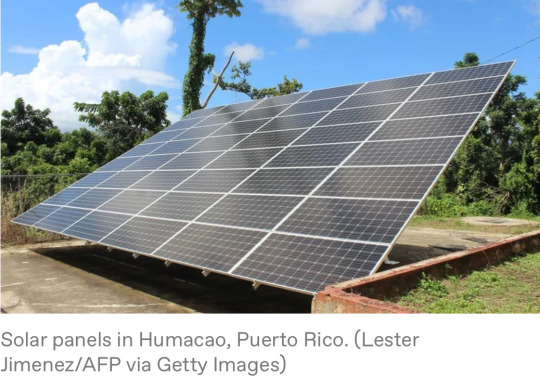
“The solar plants combined will have 200 megawatts of solar capacity — enough to power 43,000 homes — while the battery systems are expected to provide up to 285 megawatts of storage capacity. [… O]ver the next 10 years, more than 90 percent of solar capacity in Puerto Rico will come from distributed resources like rooftop solar.”
7. Tim Walz Defends Queer And Trans Youth At Length In Interview With Glennon Doyle
“Walz discussed positive legislative actions, such as codifying hate crime laws and increasing education[.… “We] need to appoint judges who uphold the right to marriage, uphold the right to be who you are [… and] to get the medical care that you need.””
8. Next-Generation Geothermal Development Important Tool for Clean Energy Economy

““The newest forms of geothermal energy hold the promise of generating electricity 24 hours a day using an endlessly renewable, pollution-free resource[… that] causes less disturbance to public lands and wildlife habitat […] than many other forms of energy development[….]”
9. Sarah McBride hopes bid to be first transgender congresswoman encourages ’empathy’ for trans people

““Folks know I am personally invested in equality as an LGBTQ person. But my priorities are going to be affordable child care, paid family and medical leave, housing, health care, reproductive freedom. […] We know throughout history that the power of proximity has opened even the most-closed of hearts and minds.”“
10. At Mexico’s school for jaguars, big cats learn skills to return to the wild

“[A team of scientists] have successfully released two jaguars, and are currently working to reintroduce two other jaguars and three pumas (Puma concolor). [… “Wildlife simulation”] “keeps the jaguars active and reduces the impact of captivity and a sedentary lifestyle[….]””
October 8-14 news here | (all credit for images and written material can be found at the source linked; I don’t claim credit for anything but curating.)
#good news#hopepunk#electric vehicles#voting#elephant#kenya#conservation#australia#battery#energy storage#africa#cats#hunting#tw animal death#student loans#student debt#debt relief#education#puerto rico#solar#solar panels#solar energy#solar power#tim walz#lgbt#lgbtq#geothermal#renewableenergy#trans rights#transgender
28 notes
·
View notes
Text
AU where the Gramarye Troupe catches wind of Apollo when he’s a teenager and takes him in. Apollo does not want to be here and is going to make it everyone else’s problem. Everyone is trying fruitlessly to make him learn magic and he firmly believes this is the stupidest shit in the entire goddamn world.
The only good thing Magnifi did, in Apollo’s correct opinion, is tell him how his bracelet worked. Apollo proceeds to use his power to figure out all of the Gramarye magic tricks & then obnoxiously explain this back to everyone to make them feel stupid.
Magnifi just sees this as an encouraging amount of promise. He’s like Apollo you are the one true heir to Troupe Gramarye & Apollo is like no thank you I am going to get a real job. Give the Troupe to Trucy please & thanks she deserves it more than those other two clowns.
#ace attorney#aa#apollo justice#trucy wright#troupe gramarye#Trucy is halfway to a jealous spiral before she catches on that Magnifi is trying to stoke a rivalry between her and her brother and then#she’s like well now I don’t want to hate him anymore & attaches herself firmly to Apollo’s side.#also btw Apollo has been deliberately sabotaging attempts to adopt him because his goal is to have the state of California pay for hia#education when he ages out of the foster system so on top of the troupe being wildly toxic and shady he’s FURIOUS that he’s probably going#to have to take out fucking student loans for law school.#is this coherent? maybe. maybe not. either way I find it funny.#eli rambles
48 notes
·
View notes